2 Dec 2019 | Artistic Freedom Commentary and Reports, Azerbaijan, Azerbaijan Incident Reports, Belarus, Belarus Incident Reports, News and features, Russia, Turkey, Ukraine
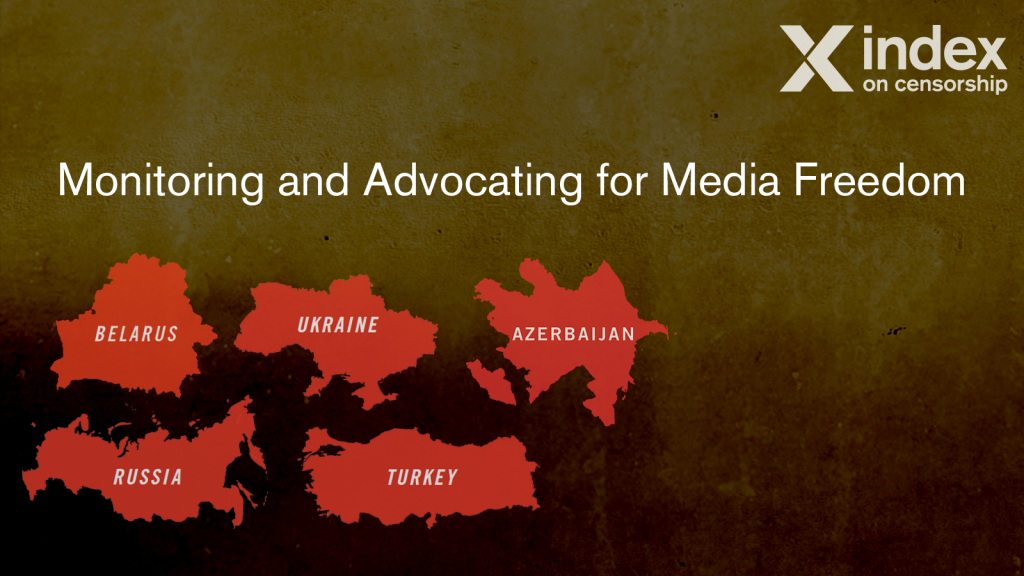
Index on Censorship’s Monitoring and Advocating for Media Freedom project monitors threats, limitations and violations related to media freedom in Azerbaijan, Belarus, Russia, Turkey and Ukraine. Previously these countries were also included in the Mapping Media Freedom project, which Index incubated and managed between 2014 – 2018.
This report summarises policy recommendations based on analysis since April, 2019. The recommendations are based on research by in-country correspondents and Index staff. Country reports published by the project since April are available on the project webpage.
After a brief background section, the report sets out key policy recommendations that apply to all the project countries, followed by key recommendations for each project country.
Background
It is essential that media freedom groups and international organisations continue to monitor, verify and document threats, limitations and violations related to media freedom in Azerbaijan, Belarus, Russia, Turkey and Ukraine, continue to raise awareness about the challenges and to advocate for change. Media freedom is severely restricted in all these countries and journalists are under great pressure.
Violence against journalists; misuse of counter-terror and security legislation to silence journalists; travel bans that isolate journalists and impact them professionally; failure to investigate violent crimes against journalists and silencing and punishing journalists through defamation and insult laws – all these are familiar tactics and increasingly common. In more recent years the introduction of restrictive internet-related legislation, such as in Russia, has opened a new frontline in the fight to safeguard media freedom.
RECOMMENDATIONS FOR ALL PROJECT COUNTRIES
- Governments and the EU must take a stronger stand for media freedom
Governments and multilateral groups, in particular the European Union (EU), must take a strong stand in defence of media freedom and journalists, both in their bilateral relations with the project countries and in multilateral processes. Governments and the EU should ensure that issues such as proposed or existing legislation that restricts media freedom, violence against journalists and failures to investigate crimes against journalists, form part of the agenda in strategic bilateral and multilateral discussions.
Countries that have a version of the Magnitsky Act (in the EU, this includes Estonia, Latvia, Lithuania and The Netherlands) should consider making use of this legislation in cases where media freedom and the safety of journalists are at stake. Countries that have not yet introduced such legislation should consider doing so. The UK should put its Magnitsky amendment into use.
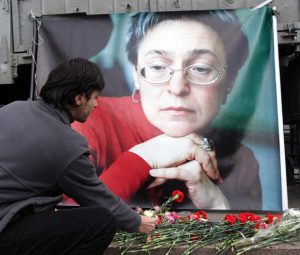
A man lays flowers near the picture of murdered journalist Anna Politkovskaya, during a rally in Moscow, Russia, 7 October 2009. CREDIT: EPA / Alamy Stock Photo
Impunity is a major challenge in all the project countries. In Azerbaijan, the death of freelance journalist Rafic Tagi, who died in hospital after a stabbing in 2011, has never been investigated properly. Belarussian cameraman Dzmitry Zavadski disappeared in 2000 on his way to meet journalist Pavel Sheremet, later killed in Ukraine in 2016. Zavadski’s body was never found.
The instigator of the 2006 contract killing of investigative journalist Anna Politkovskaya in Russia is still not known, nor is the motive. In 2018 the European Court of Human Rights found that the Russian authorities had failed to carry out an effective investigation into her killing. Turkey failed to investigate the death of editor Rohat Aktaş, killed when he was covering hostilities between Kurdish separatists and Turkish forces in 2016.
Ukrainan journalist Pavel Sheremet was killed by a car bomb in Kyiv in 2016 and, despite statements from the authorities that the case is a priority, there has been no progress. All the project countries should commit to investigating unsolved killings of journalists and should implement the guidelines in recommendation CM/Rec(2016)4 of the Committee of Ministers of the Council of Europe.
In relation to impunity, the guidelines envisage that when investigations and prosecutions have not resulted in justice member states can consider establishing special inquiries or independent specialised bodies, and that the latter could involve participation by respected media and/or civil society figures.
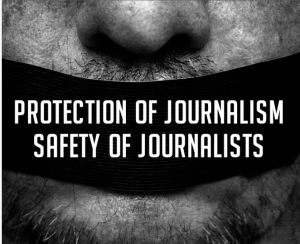 Council of Europe member states must engage fully with the platform for journalism
Council of Europe member states must engage fully with the platform for journalism
Council of Europe member states must engage more actively with the Council of Europe’s Platform for the protection of journalism and safety of journalists. The partner organisations of the platform, which include Index on Censorship, should continue to use the platform to raise awareness of media freedom violations and threats to journalists. This should include advocating for states to respond to all alerts communicated to the platform.
The overall response rate from states in 2018 was only 39%. It is also important that states provide substantive replies to alerts and engage in follow-up dialogue with the partner organisations. The platform is an underused mechanism, with potential to achieve more. Partner organisations can also be of assistance to member states that are willing to engage fully.
Belarus is not a member of the Council of Europe, but other international organisations and processes, such as the special procedures of the United Nations human rights council, should be engaged to follow up cases and issues in Belarus.
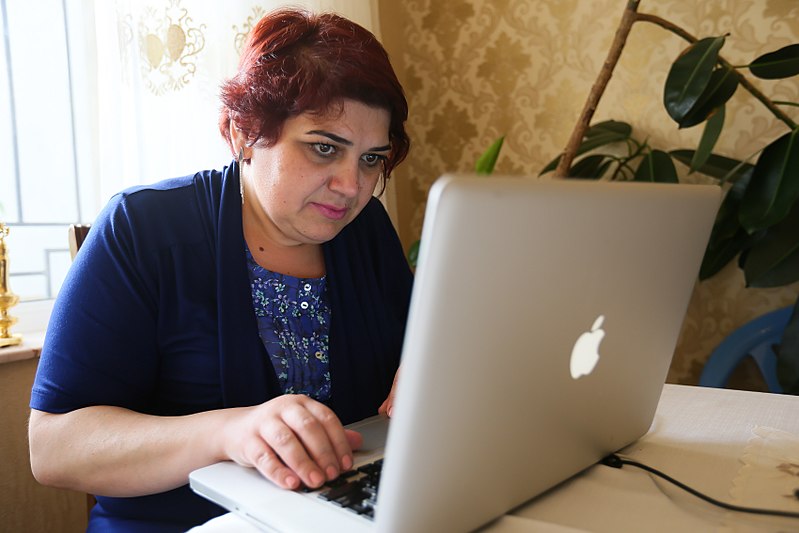
Azerbaijan must halt its use of travel bans for journalists including Khadija Ismayilova
AZERBAIJAN
- The EU must defend media freedom in negotiations with Azerbaijan
The EU must use its influence to defend media freedom and journalists in Azerbaijan. Negotiations on an agreement to replace the EU-Azerbaijan Partnership and Cooperation Agreement, in place since 1999, are at an advanced stage and will need to be brought to a conclusion by the new European Commission. It is extremely important that the EU raises media freedom and human rights in these negotiations.
In 2018, the European Parliament adopted a resolution which recommended that the EU should make deepening of relations with Azerbaijan conditional on respecting democratic values and human rights, and that it should ensure that Azerbaijan frees its political prisoners (including journalists such as Afgan Mukhtarli) before the negotiations on a new partnership agreement are concluded. Mukhtarli remains imprisoned.
Azerbaijan must refrain from targeting journalists’ online activities, including through call hacking, internet blocking and distributed denial-of-service (DDoS) attacks. In October, internet blockages and disruption to mobile phone services were reported in central Baku in connection with ongoing protests. Several journalists were also detained or subjected to physical violence during the protests. Social media platforms such as YouTube should respect Azerbaijani users’, including journalists’ right to seek, receive and impart information. Platforms should implement terms and conditions consistently and transparently, including when dealing with harassment of journalists by alleged state-sponsored trolls.
Azerbaijan must halt its use of travel bans for journalists. For example, the well known journalist Khadija Ismayilova is currently under a travel ban. OSCE Media Freedom Representative Harlem Désir has stated that it is a serious hindrance to her work as a professional journalist.
BELARUS
- Amend the law on mass media
Belarus must amend the law on mass media. The legislation currently requires journalists, including freelancers, who work for media outlets registered outside Belarus to obtain accreditation from the foreign affairs ministry. This has led to journalists being fined repeatedly. At a very minimum, Belarus must urgently establish procedures that enable journalists to appeal rejected accreditation requests.
- Other governments must signal that restrictions are not acceptable
Other governments must make it clear to Belarus that restrictive and repressive actions against journalists will not be tolerated. This applies to the requirements for accreditation for journalists working for non-Belarussian media outlets above, but also to the practice of detaining journalists for short periods. Some observers have credited Belarus’ tendency to impose fines on journalists or to detain them for short periods – rather than sentence and imprison them – as an attempt to build alliances in the West at a time when relations with Russia are weak. Other governments need to signal clearly it is not acceptable.
- Train journalists in human rights and United Nations procedures
In the case of Belarus, which is not a member of the Council of Europe, it is important that support and training aimed at enabling journalists to defend their rights includes training on other international organisations and processes, such as the special procedures of the United Nations human rights council, including the special rapporteur on the situation of human rights in Belarus.
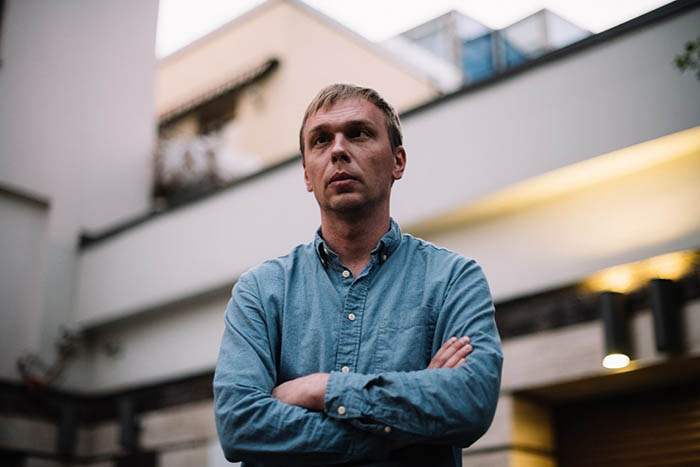
Russia must investigate cases of trumped-up charges against journalists such as Ivan Golunov
RUSSIA
- Halt the extension of foreign agent legislation to individual journalists
Russia must refrain from finalising the legislative changes that would extend the scope of “foreign agent” to individual journalists. Existing problematic legislation already requires media outlets that receive funds from abroad to register as foreign agents. At the time of writing the Duma has approved changes that would extend this to individual journalists, including freelance journalists and bloggers. Any one of these receiving payments for services, or a salary from abroad, would need to register with the ministry of justice. All published work would need to display a “foreign agent” label. This legislation should not proceed, and existing legislation that labels media outlets as foreign agents should be reviewed.
- Ensure access for journalists to court proceedings
Access to court proceedings is a frequent problem for journalists. As stated in Opinion No. 8 of the Consultative Council of European Prosecutors: “Transparency in the performance of the prosecutor’s duties is an essential component of the rule of law, and one of the important guarantees of a fair trial. Not only must justice be done, but it must also be seen to be done. In order for this to be possible, the media should be able to provide information on judicial, criminal or other proceedings” (paragraph 30). The authorities must review existing processes for compliance with international standards.
- Investigate cases of trumped-up charges against journalists
The authorities must thoroughly investigate cases of trumped-up charges against journalists and ensure that the instigators are brought to justice. Recent incidents include the high-profile case of Ivan Golunov, arrested for possession and trafficking of drugs, and what appears to be a fake letter sent in the name of Nikita Telizhenko with the aim of discrediting him.
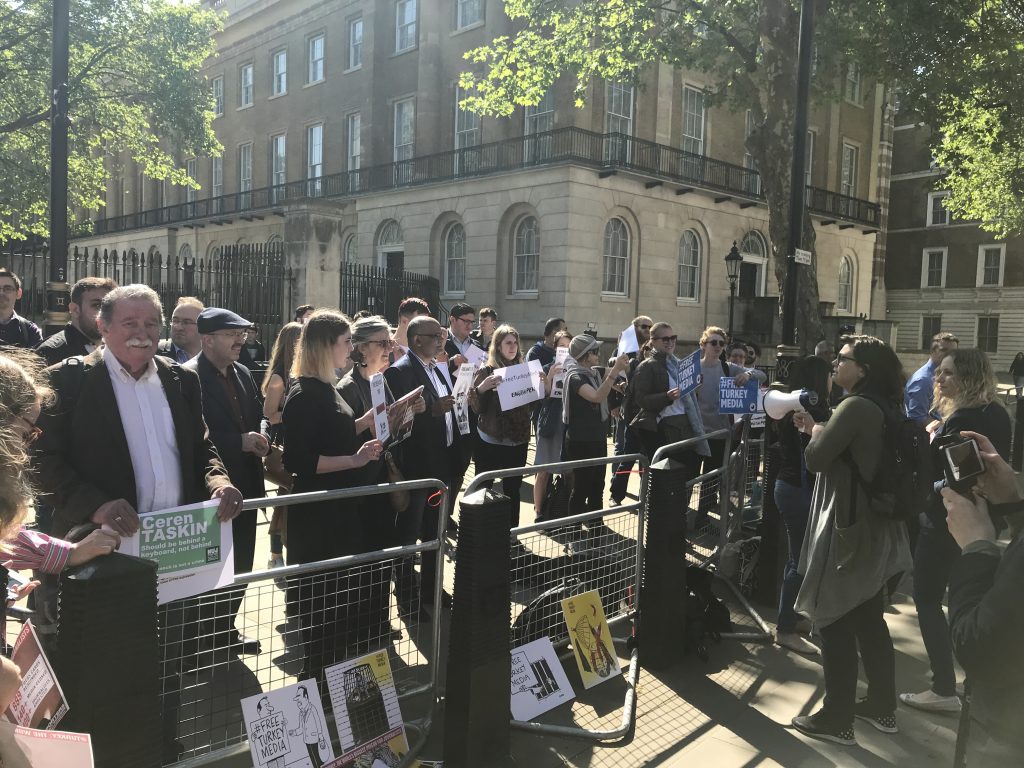
Index on Censorship magazine editor Rachael Jolley leads chants in support of Turkey’s jailed journalists ahead of Turkish President Erdogan’s visit to Downing Street in May 2018
TURKEY
- Other governments should not support Turkey’s judicial reform strategy, at least not in its current form
The judicial reform strategy (JRS), launched in May, 2019, will not achieve any meaningful change, at least not in its current form. Turkey’s judicial system is not independent: it is overloaded with cases, many which concern journalists, and it has been undermined through the large-scale dismissal of judges. It is extremely important that other countries and international organisations scrutinise the judicial reform strategy, and make it clear that in its current form it is completely inadequate when it comes to addressing the enormous structural problems of the judiciary.
- Implement the recommendations of the United Nations special rapporteur
In May 2019, the United Nations special rapporteur on the promotion and protection of the right to freedom of opinion and expression published a follow-up report to an earlier visit to Turkey in 2016. The rapporteur had made a series of recommendations in 2016, which included releasing jailed journalists and reversing the closure of media outlets. The follow-up report found that Turkey had either failed to implement or had contravened all the recommendations, with the exception of one (lifting the state of emergency). Turkey should urgently implement all the recommendations made by the United Nations special rapporteur.
- Support trial observation
Diplomatic representations and international organisations, including the EU, need to support observation of trials that involve journalists and media outlets. High-profile trials in central locations can be well-attended by observers, but coverage of trials in remote locations is more limited. Support can include sending representatives to follow trials and/or financial support for organisations that monitor trials.
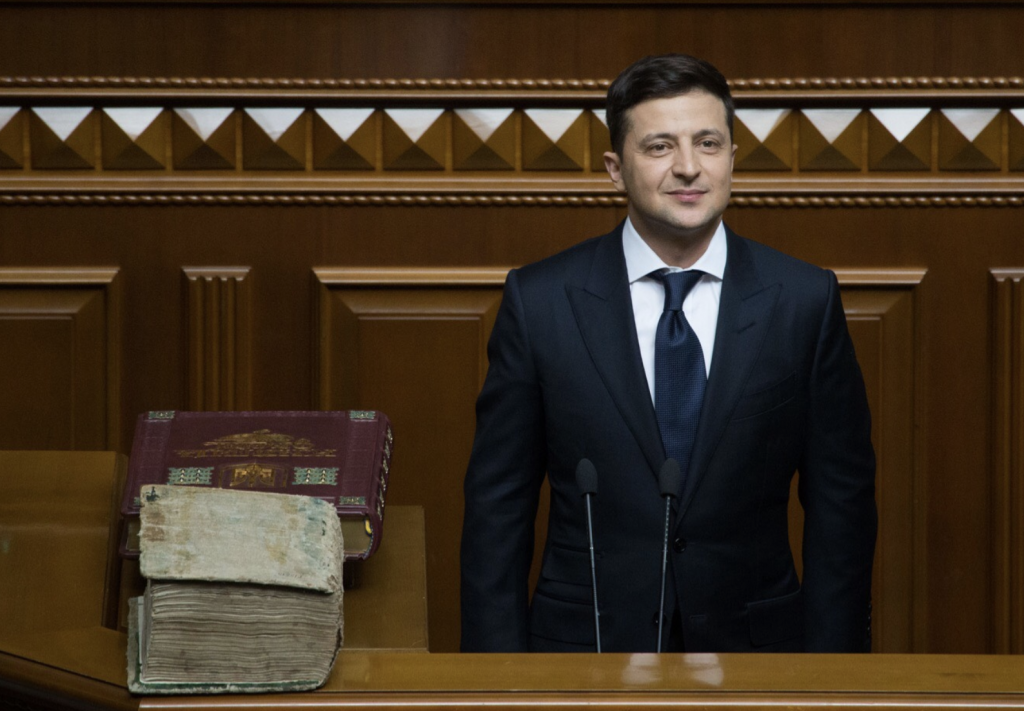
Ukraine President Volodymyr Zelenskiy must engage with the media. Photo: Wikimedia
UKRAINE
- The government must review state support for far-right groups associated with extremism
The government needs to undertake an independent and transparent review of state support, including financial support for far-right groups associated with extremism. The review should involve international experts. It should include investigating the possibility of state security force collusion with paramilitary and extremist organisations and thorough investigations of alleged involvement in violence against journalists, such as the unsolved murder of Oles Buzina.
- Elected representatives must engage with the media
President Volodymyr Zelenskiy reportedly held a 14-hour press conference in October, attended by 300 journalists. Whether it signals a new era in the relationship between Ukraine’s elected representatives and the media remains to be seen. The failure of the president and lawmakers to engage meaningfully with the media in the past has been a challenge for journalists and this needs to change.
- Invest in the public service broadcaster
In the highly divisive media landscape, the role of the public broadcaster is extremely important. Ukraine’s public broadcasting company is severely underfunded and currently has a very small audience. As Index on Censorship outlined in its Demonising the Media report a year ago, a significant but underreported trend in the region is the threat to public broadcasters. A number of national broadcasters in the EU and neighbouring countries were brought under closer government control in 2014-18. Ensuring both sufficient funding and editorial independence are crucial in ensuring the public’s right to know is defended.
29 Nov 2019 | Russia, Russia Incident Reports
[vc_row][vc_column][vc_column_text]
Index on Censorship’s Monitoring and Advocating for Media Freedom project tracks press freedom violations in five countries: Azerbaijan, Belarus, Russia, Turkey and Ukraine. Learn more.
[/vc_column_text][vc_custom_heading text=”21 Incidents” use_theme_fonts=”yes”][/vc_column][/vc_row][vc_row][vc_column][vc_column_text]
State-run Channel One cut out blogger’s joke about police
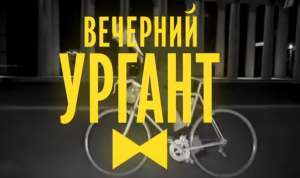
Ivan Urgant’s evening talk show edited out a joke about the police by blogger Danila Poperechny.
29 October – YouTube blogger Danila Poperechny said that his joke about the police was edited out of an episode of the late-night show Vecherny Urgant (Evening Urgant) at the state-owned Channel One.
After public outcry, the presenter Ivan Urgant showed the deleted joke in the next episode of the program. Poperechny’s joke alluded to the police raids carried out at the concerts of independent artists considered disloyal to the ruling government, and the fact that such artists would rarely appear on state-owned television stations.
Links:
https://twitter.com/Spoontamer/status/1188921512528613376
https://meduza.io/news/2019/10/30/v-vechernem-urgante-pokazali-vyrezannuyu-shutku-danily-poperechnogo-o-politsii-tsentra-e-v-ney-net
https://meduza.io/news/2019/10/30/v-vechernem-urgante-pokazali-vyrezannuyu-shutku-danily-poperechnogo-o-politsii-tsentra-e-v-ney-net
Categories: Censorship
Source(s) of violation: Government/State Agency/Public official(s)/Political party
Bookstore chain refused to sell an issue of Diletant history magazine dedicated to Molotov-Ribbentrop pact
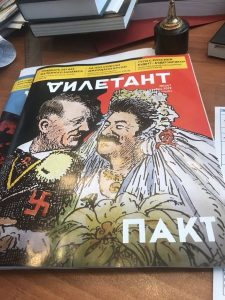
The Diletant history magazine that a bookstore chain refused to sell because it covered the Molotov-Ribbentrop pact. Credit: Alexey Venediktov via Twitter.
28 October – Bookstore chain Molodaya Gvardia refused to sell an issue of the Diletant history magazine dedicated to the Treaty of Non-aggression between Germany and the Union of Soviet Socialist Republics, known as the Molotov-Ribbentrop pact. Alexey Venediktov, editor-in-chief of Ekho Moskvy radio station, which supports the publication of the magazine, wrote about Molodaya Gvardia’s stance on Twitter.
The bookstore’s press office told Znak.com that they were concerned about potential problems with the authorities related to the article 20.3 of the Administrative code, which bans the reproduction of Nazi symbols. The cover of the magazine is a reproduction of a 1939 American caricature depicting Adolf Hitler and Josef Stalin as a bride and groom.
Vitaly Dymarskiy, editor-in-chief of Diletant magazine, told Telegram channel Rasstriga that he interpreted the bookstore’s decision to be an act of self-censorship.
Gennady Zyuganov, leader of the Russian Communist party, claimed that he would sue the magazine and would file a complaint to Roskomnadzor. He reportedly told the Telegram channel Podyem that the prosecutor should investigate and put those responsible in jail.
On 28 October, the State Historical Museum cancelled the monthly lecture organized by Diletant magazine, citing disagreement with the views expressed in the last edition. The museum’s press service reportedly told Interfax news agency that it was a “principled position” on the part of the museum’s management, after they became aware of the magazine’s content.
Links:
https://twitter.com/aavst/status/1187302972876832768/photo/1
https://www.bbc.com/russian/news-50213831
Categories: Censorship
Source(s) of violation: Government/State Agency/Public official(s)/Political party
CEO of Karelia firm sued local journalist over article about his bonus
25 October – Pavel Degtyarev, CEO of Karellesprom, filed a million rubles ($15,630) defamation lawsuit against Svetlana Lysenko, a journalist with the local website Vesti Karelii, Stolicaonego.ru reported. The Karelia republic is a majority shareholder of Karellesprom.
Degtyarev claimed that Lysenko’s July article entitled “Spoon of tar in a barrel of forest honey: why did the director of Karellesprom receive a 26 million ruble ($406,383) bonus?” damaged his professional reputation. Degtyarev didn’t deny receiving the bonus.
In the article, Lysenko questioned the ethics of the bonus, arguing that Republic of Karelia is not wealthy enough to grant such premiums to management.
Links:
https://stolicaonego.ru/analytics/gendirektor-karellesproma-zahotel-poluchit-million-s-zasluzhennogo-zhurnalista-karelii/
https://vestikarelii.ru/kapit/lozhka_degtja_v_bochke_lesnogo_meda/
https://www.parkgagarina.info/index.php/obshchestvo/regiony-rossii/30437-kareliya-poluchil-26-millionov-premii-mozhno-i-v-sud-podat-na-zhurnalista.html
Categories: Subpoena / Court Order/ Lawsuits
Source(s) of violation: Known private individual(s)
Yekaterinburg journalist accused of insulting authorities
21 October – Yekaterinburg-based journalist and political analyst Fedor Krasheninnikov was accused of insulting the authorities, Meduza reported.
On 21 October, policemen went to Krasheninnikov’s home to officially summon him to the police department. When the journalist arrived at the local police department with his lawyer, they were told that somebody named Salavat Khaziev had filed a complaint against Krasheninnikov for insulting the authorities on his Telegram channel. In it, Krasheninnikov allegedly criticized the prolongation of the arrest of Leonid Volkov, former head of the campaign for opposition politician Alexey Navalny, and called the judges who sentenced him prostitutes.
The journalist denied any wrongdoing. He said that he didn’t know the identity of the person who filed the complaint against him. Krasheninnikov reportedly told Meduza that he attributed the origin of the case to local authorities’ “unhealthy concerns” about him. According to Meduza, he said that the authorities constantly call him names and scold him in pro-government anonymous blogs. In his commentary to Kommersant, he said that his comments about Volkov were private and emotive.
According to reports, a court will determine the future of the complaint.
Links:
https://meduza.io/feature/2019/10/28/na-politologa-i-zhurnalista-fedora-krasheninnikova-zaveli-delo-ob-oskorblenii-vlasti-iz-za-posta-v-telegrame-my-s-nim-pogovorili?utm_source=facebook.com&utm_medium=share_fb&utm_campaign=share&fbclid=IwAR27tVoo5fLwnB0664GVD9MX_H8TiUsIDXLw36qTjr-Z5g7RC8JCDezxIUg
https://www.kommersant.ru/doc/4141118
Categories: Subpoena / Court Order/ Lawsuits, Criminal Charges/Fines/Sentences
Source(s) of violation: Police/State security, Known private individual(s)
Court refused to force Roskomnadzor to register opposition politician’s media outlet
24 October – Ostankinsky District Court refused to force Roskomnadzor (the Russian state media regulator) to register a media outlet founded by opposition politician Dimitry Gudkov.
Its editor-in-chief Alexey Obukhov filed a complaint to the court after the registration of his media outlet was refused numerous times. Obukhov said that among Roskomnadzor’s reasons were that he didn’t bring proof that he didn’t have a second citizenship and that he didn’t indicate the zip code in one of the documents. During the hearing, a Roskomnadzor representative said that Obukhov didn’t prove that he hadn’t been previously incarcerated.
Obukhov said that he had brought all the documents previously requested by Roskomnadzor to the court. The judge suggested that he re-apply for registration. Obukhov has been trying to register Gazeta Gudkova newspaper as an official media outlet since March 2019.
Links:
https://t.me/azlet1/223
https://tvrain.ru/news/sud_otkazalsja_objazat_roskomnadzor_zaregistrirovat_gazetu_dmitrija_gudkova-496103/?fbclid=IwAR2_cnt8EWJpSMmvs0DCLIhoxreGwm2ORwhAUWALIUyjkZ5rXnTe5A4X7FY
https://tvrain.ru/news/na_roskomnadzor_podali_v_sud_iz_za_otkaza_v_registratsii_gazety_gudkova-494840/?fbclid=IwAR3_KR30UhaPBrTk-0T_2MJb-jtfuRLlCiRVnkfPEtDoA5sqQD8GNGSGGks
Categories: Legal Measures
Source(s) of violation: Government/State Agency/Public official(s)/Political party, Court/Judicial
Grani.ru reporter assaulted while working on a story about a housing scheme
24 October – Andrey Novichkov, reporter with independent media outlet Grani.ru, was assaulted by two unknown men while working on a story about a state-funded housing scheme, Mediazona reported.
Novichkov was accompanying the deputy of the Moscow city parliament Elena Shuvalova, who came to inspect one of the houses, which were built for those eligible for free housing (families with more than 3 children, disabled people, military personnel, orphans, etc.). According to the investigation of the Anti-Corruption Foundation, however, the apartments in the house were given to dozens of Moscow officials and supporters of the city’s mayor, Sergey Sobyanin.
When the deputy and the journalist entered the house and took photos, four men came out of an apartment, which reportedly belongs to the deputy head of Moscow city parliament Olga Timofeeva, and assaulted the journalist. They tried to push him inside the apartment, threatening to break his tablet and lock him inside. Mediazona published a video of the assault. When Shuvalova went to call the police, the assailants released the journalist.
Links:
https://zona.media/news/2019/10/24/dom?fbclid=IwAR0YcVFtTaUMGLuD2w5Je4fb5j4k2kfS1Fvuj6HjxofMP7-JkLwzSxk4W1Y
https://tvrain.ru/news/na_deputata_mosgordumy_i_zhurnalista-496084/
https://www.facebook.com/elenashuvalova.ru/posts/1163759710481949
https://navalny.com/p/6147/
Category: Physical Assault/Injury, Intimidation
Source(s) of violation: Unknown
Editor-in-chief of NewsVo.ru fined twice for alleged ‘obscene’ language in the blog section of the site
23 October – Evgeniya Sibirtseva, editor-in-chief of Vologda local media outlet NewsVo.ru was fined 5,000 rubles ($78) for alleged ‘obscene’ language in a reader’s blog of the news website, 7×7 reported. The journalist reportedly said that she was never notified about the hearing, and found out about the court’s decision post-factum via a text message from her bank, which informed her that a fine had been withdrawn. Sibirtseva said that she was charged the same fine twice – from two different bank accounts. She was told that the second charge would be returned to her account.
She told 7×7 that in 2019 NewsVo.ru was fined for obscene language in the blogs section of the website three times. “It’s just an excuse to fine the media and fill the officials’ pockets,” Sibirtseva said in a statement at NewsVo.ru.
Links:
https://7×7-journal.ru/articles/2019/10/24/vologodskie-pristavy-dvazhdy-spisali-s-glavreda-regionalnogo-izdaniya-shtraf-za-mat-v-bloge-karelskoj-obshestvennicy?fbclid=IwAR06i8tskSsWy4SpmKyijSNze9OXOiRuSj7l2u3YxI_ogSTHLM9534iUngY
https://newsvo.ru/blogovo/123118
https://lenizdat.ru/articles/1156425/
Category: Criminal Charges/Fines/Sentences
Source(s) of violation: Government/State Agency/Public official(s)/Political party
Rossiya channel withdraws episode of a show covering the collapse of a dam at Krasnoyarsk gold mine

State-owned Rossiya channel withdrew an episode of Pryamoy Efir, which covered the story of a dam that collapsed in a gold mine in the Krasnoyarsk region.
23 October – State-owned Rossiya channel withdrew an episode of the talk show Pryamoy Efir, after it had been shown live and in full to viewers in Siberia and the far eastern regions of Russia, Krasnoyarsk outlet NGS24.RU reported. The episode covered the story of a dam that collapsed in a gold mine in the Krasnoyarsk region (Siberia) in October and caused the deaths of at least 15 people.
Live shows on Russian television are broadcast in the furthermost eastern time zone first, and then replayed in the same time slot in more time zones that are further west. The episode of Pryamoy Efir, which is hosted by the prominent TV presenter Andrey Malakhov, was withdrawn and not shown in the more westerly time zones. It was replaced with another episode of Pryamoy Efir.
A reporter from NGS24.RU took part in the show. The outlet reported that the episode was removed because of a call Rossiya received from the authorities. NGS24.RU published a fragment of the deleted show, in which Malakhov was reading out the results of an express test of the water probe from Seiba river, where the dam collapsed, indicating highly abnormal presence of chemicals, including mercury. Ecologists who took part in the show reportedly suggested that this may have been caused by the use of outdated technologies in the gold mine and that the chemical leaks could seriously threaten the ecology of the Krasnoyarsk region.
The Rossiya press office said that the Pryamoy Efir episode was only ever intended for broadcast in the far eastern regions.
Links:
https://ngs24.ru/news/more/66280972/?fbclid=IwAR0iDWrlmo9deMMIb8CTuFEdFaSghfhr-AgbARPpT4h6Gktr12itQetT6d8
https://www.bbc.com/russian/news-50157041
https://www.bbc.co.uk/news/world-europe-50108413
Category: Censorship
Source(s) of violation:
Journalist detained in Krasnodar region
22 October – Gleb Pyanykh, former NTV journalist and TV presenter who is currently running his own YouTube channel with reports on politics and the economy, was detained in the Krasnodar region, RBC reported.
Pyanykh went to Dinskaya village to work on a story about a villa that was illegally built on agricultural lands, which allegedly belongs to the governor of the Krasnodar region, Veniamin Kondratyev. The journalist was stopped near the villa by a uniformed security guard, who questioned Pyanykh about his work and demanded that he go to the security office. At the same time, another man in plain clothes arrived in a car and blocked the way out. When Pyanykh started to film what was going on with his mobile phone, the men let him drive away.
However, after 500 meters the journalist’s car was stopped by police. They said that they received a call from the villa’s security guards and demanded that the journalist write an explanatory note about his activities. The policemen detained Pyanykh for about an hour and then released him without charge.
Links:
https://www.rbc.ru/politics/22/10/2019/5daf184e9a7947d00f05acac?fbclid=IwAR3yngMmwi3v7_yp8EZdBbKzPEuMYQnsWismzNUyDGb85_FdokXrogAJjwY
https://www.youtube.com/watch?v=P_5tjz9KHCI
Category: Arrest/Detention/Interrogation, Blocked Access
Source(s) of violation: Police/State security, Private security
Novaya Gazeta reporters assaulted at hunting centre in Moscow region
19 October – Svetlana Vidanova and Artyom Raspopov, correspondents with independent newspaper Novaya Gazeta, were assaulted while working on a story about the illegal training of hunting dogs, Novaya Gazeta reported. Wild animals in Solnechnogorsk district of Moscow region were reportedly being hunted and killed during the trainings.
The journalists were accompanying animal rights activists when they were inspecting the area around the illegal training centre and found two fox skulls and a dead dog. When they entered the centre’s premises, the security guards approached Vidanova, twisted her arms, punched the camera and took her press card. The guards also took away Raspopov’s mobile phone and threw it over the fence, twisted his arms and pushed him out of the centre’s gate.
Police were called to the scene, but did not interfere while the assault was ongoing. The journalists received medical attention and filed a police report.
Links:
https://www.novayagazeta.ru/news/2019/10/19/156252-na-territorii-pritravochnoy-stantsii-v-moskovskoy-oblasti-napali-na-na-zoozaschitnikov-i-zhurnalistov-novoy?utm_source=fb&utm_medium=novaya&utm_campaign=-na-territorii-pritravochnoy-stantsii-kr
https://www.facebook.com/novgaz/photos/a.136917239684305/3217048941671104/?type=3&theater
Category: Physical Assault/Injury
Source(s) of violation: Private security
Roskomnadzor banned a report about a nationalist rally published 6 years ago
17 October – Russian state media regulator Roskomnadzor notified Tayga.info about the inclusion of their article about a 2013 nationalist rally in Novosibirsk in the list of banned materials, Tayga.info reported.
The article entitled “Novosibirsk divided into two Russian rallies” was published on 4 November 2013. Explaining the ban, Roskomandzor cited a Yekaterinburg court’s decision from 5 April 2018, which ruled that the article contained an extremist slogan. However, the slogan in question was deemed to be extremist by the court only in 2017, four years after the publication. The 2018 trial was initiated by the local prosecutor’s office. Tayga.info was never notified about the hearing before receiving Roskomnadzor message on 17 October 2019.
Tayga.info’s editors removed the rally slogan from the article, along with two photographs where it’s visible. They are consulting lawyers about the matter. In a statement, the website’s editorial team said that they didn’t consider the post-factum removal of information, which at the time of publication was not banned, to be legal.
Links:
https://tayga.info/149498?fbclid=IwAR16jH060QEZvJmQD45e9aSR1wwYCO_tGszBD1k_5FehW-o1SPUG3UMcwmU
https://tayga.info/114408
https://zheleznodorozhny–svd.sudrf.ru/modules.php?name=sud_delo&name_op=case&_id=219599949&_deloId=1540005&_caseType=&_new=0&srv_num=2
Category: Legal Measures
Source(s) of violation: Government/State Agency/Public official(s)/Political party
13 Yekaterinburg journalists barred from covering trial on murder of local woman
17 October – Lenisnky district court of Yekaterinburg approved an appeal filed by prosecutors and supported by defense to close the trial on the murder of a local woman, Ksenia Katorgina, to the press and the public, MK-Yekaterinburg reported.
The journalists were removed from the courtroom. They were also prevented from filming the three suspects in the court’s halls, and were told not to film them through the windows when they were brought to the court.
Links:
https://eburg.mk.ru/incident/2019/10/17/nachalsya-sud-po-vybory-mery-presecheniya-dlya-podozrevaemykh-v-ubiystve-katorginoy-zhurnalistov-ne-pustili.html
https://www.e1.ru/news/spool/news_id-66273460.html
https://74.ru/text/criminal/66273460/
Category: Blocked Access
Source(s) of violation: Court/Judicial
Journalist of Samarskaya Gazeta forced to quit after publicly revealing city mayor’s efforts to censor the newspaper
17 October – Maxim Melnikov, journalist with Samara newspaper Samarskaya Gazeta, was forced to quit his job after publicly criticizing the editorial standards of the newspaper, which he said bowed to pressure imposed by officials from Samara’s mayor’s office.
On 10 October, a video from a local journalism conference was published with a 10-minute speech from Melnikov, in which he said that he published an ironic post on Samarskaya Gazeta’s official Vkontakte account about a street that was flooded due to a burst pipe.
Within 30 minutes of Melnikov having posted the comment, Samarskaya Gazeta’s editor-in-chief reportedly received a call from the city mayor’s office demanding that the post be deleted. According to Melnikov, that the editor and the unnamed official negotiated a deal that the outlet would keep the post, but publish only positive news about the incident in the following two or three days.
After the video of his conference speech was published, he was asked by the newspaper’s management to resign. The journalist reportedly expressed frustration that the authorities censor people who speak about problems, rather than trying to solve them.
Links:
https://www.facebook.com/story.php?story_fbid=2710398908992030&id=100000658419213&sfnsn=mo
https://zona.media/news/2019/10/17/mlnkv?fbclid=IwAR0dGzSCvePc3ziDVz42BBo6Pt5p3RL4oxyuZDpkkV_vsmZm8fZ7g8L5DLA
https://www.youtube.com/watch?v=-5RgWCstaIg&t=0s&fbclid=IwAR1QGckR5iPrq78gUYxGPF_fkDsws-e-tHGe1-V0ANXgcnM_vR_mOEaxKoE
Category: Censorship
Source(s) of violation: Employer/Publisher/Colleague(s)
Police searched the homes of journalists in relation to Anti-Corruption Foundation case
15 October – Police searched the homes of four journalists in different Russian regions, as part of a money-laundering probe into opposition politician Alexei Navalny’s Anti-Corruption Foundation, reported multiple outlets.
In the early hours of 15 October, police raided the home of Alexey Seregin, a Mari El-based journalist working for Idel.Realii. He told Idel.Realii that the police conducted a 3-hour search of his home and seized his personal belongings, including a computer, a mobile phone and a recorder. Seregin said that he had covered Navalny’s activities in the Mari El region, but had never worked with the politician’s Anti-Corruption Foundation.
A second Idel.Realii journalist, Dmitry Lubimov, wrote in a Facebook post that police carried out a simultaneous raid of his Yoshkar-Ola apartment, where he has not lived since February. Lubimov believed it was an attempt to put pressure on him and prevent him from his carrying out his work, which included covering Navalny’s activities.
A simultaneous raid was also carried out at the Smolensk home of Alexey Volkov, editor-in-chief of local website Keytown.me. Keytown.me had published news articles about the activities of the local office of Navalny’s political movement. Police told Volkov that the search would be conducted in connection with the money laundering case against the Anti-Corruption Foundation. When Volkov asked how he was connected to the money laundering investigation against the Anti-Corruption Foundation, police said: “This is what we will find out”. The search lasted two hours, during which the police threatened Volkov’s wife that they’d take away their two children, including their 4-month-old baby, if she didn’t sign a non-disclosure agreement. The police seized the journalist’s personal belongings, among them two computers, a hard drive, a mobile phone and all bank cards, even the one that was used for receiving children’s welfare. After the raid, the journalist was reportedly questioned for an hour by the investigator of the Investigative Committee of Smolensk region. Volkov subsequently told 7×7 that he had nothing to do either with the Anti-Corruption Foundation or with the local office of Navalny’s movement, and only covered them in the news.
On the same day in Vladimir, the police searched the editorial office of local press club Dovod. Its journalists were questioned over the case against the Anti-Corruption Foundation. The police seized laptops and computers, and the smartphone of the editor-in-chief, Kirill Ishutin.
On 16 October, police searched the home of Arkhangelsk-based journalist Yaroslav Varenik, seizing the hard disk of his computer, his notebook and his phone, 29.Ru reported. Varenik was taken to the police department for questioning and then released the same day.
In the days that followed, police searched the Moscow headquarters of the Anti-Corruption Foundation and the homes of the employees of its 30 regional offices.
Links:
https://www.idelreal.org/a/30223538.html?fbclid=IwAR1fS0Os9OcKVnacVV2WqIbKHD98PkGNS9_TYo-Xx8GGxlGXl-223tr4vgA
https://www.facebook.com/lemuyel/posts/2494914360562191?__tn__=H-R
https://29.ru/text/politics/66272740/
https://meduza.io/news/2019/10/16/v-arhangelske-u-zhurnalista-izdaniya-29-ru-proveli-obysk-po-delu-fbk-eto-uzhe-chetvertyy-takoy-sluchay-za-dva-dnya?utm_source=facebook.com&utm_medium=share_fb&utm_campaign=share&fbclid=IwAR3XddAIXFMofeyy74HENB6xsPClnKeZ-wK1vEp5r35oGfXHXsRUeI9rcp8
https://7×7-journal.ru/articles/2019/10/15/v-smolenske-sledovateli-prishli-s-obyskom-k-redaktoru-novostnogo-sajta-keytown-me-po-delu-fbk?fbclid=IwAR1cVKvdlHwUE379eAhIqwFHPBjQT2ZSNz0wQGahauE0JurA6PHAQR2SCOg
https://www.dovod.online/v-redakcii-dovod-prohodit-obysk/
Category: Arrest/Detention/Interrogation
Source(s) of violation: Police/State security
Proekt journalists received threats after publishing story on Russian mercenaries in Libya
15 October – Roman Badanin, the founder and editor-in-chief of investigative media outlet Proekt, told Reuters about the surveillance, hacking attacks, and threats that Proekt journalists have been subjected to following the publication of a story about Russian mercenaries in the Libyan Civil War earlier this year.
According to Badanin, the journalists who worked on that investigation received explicit threats of physical violence via email. He said that attempts to hack the journalists’ accounts on Facebook, Telegram and Gmail were also made. Badanin referred to an incident in which Maria Karpenko, a Proekt reporter based in Saint Petersburg, was followed by an unidentified man who was filming her. Badanin said he believed that it was useless to report the threats to the police, and that he believed that publicity might be a better way to protect the journalists.
Since March Proekt has published reports on the activities of a Russian mercenary group known as CHVK Vagnera and linked to Saint Petersburg businessman Evgeny Prigozhin. The press service of his firm Konkord Management & Consulting refused to give a comment to Reuters.
Links:
https://www.proekt.media/investigation/prigozhin-libya/
ttps://ru.reuters.com/article/topNews/idRUKBN1WU252-ORUTP
https://tvrain.ru/news/zhurnalisty_proekta-495495/?fbclid=IwAR1tmNVK1QkUSVwLNDRcWhKJ5mt99OUT1MxGn_lPl_2aMCutwsFVheJvwfo
Category: Intimidation, DDoS/Hacking/Doxing
Source(s) of violation: Corporation/Company, Known private individual(s), Unknown
Yaroslavl journalist’s car burnt out
13 October – On the night of 12 October, the car of Marina Borbat was set on fire and burnt out, Regnum news agency reported. Borbat is the director of Yaroslavl regional broadcaster DIA-TV. Borbat believes the arson could be related to a previous conflict with a local crime boss.
According to Igor Yamshikov of the All-Russia People’s Front movement, posting on the Yaroslavl branch’s Facebook page, said they believe that the arson attack was linked to Borbat’s journalistic activities.
According to Yamshikov, Borbat had a run-in with a crime boss, after her filming equipment went missing while she was covering a story on 26 September 2017. Borbat reportedly filed a complaint to the police, and a similar complaint was filed by the editor of Severyanka local newspaper, but the police did not find any wrongdoing on the part of the crime boss.
In a separate case, the crime boss was reportedly found guilty of hooliganism and sent to prison. He is due to be released shortly. Borbat said that while she had no evidence that the damage of her car was linked to the crime boss, she knew that several people who had conflicts with him had their cars burnt out.
Links:
https://lenizdat.ru/articles/1156388/?fbclid=IwAR3NNblx_QVDyjP6NA5Us1nLJ9kFdUPym4Li3v9rQrcSK66pSH88Y18z8mI
https://regnum.ru/news/accidents/2748889
https://sobesednik.ru/proisshestviya/20191016-u-redaktora-telekanala-v-yaroslavskoj-oblasti-sgorela-mashina
Category: Intimidation/Attack to Property
Source(s) of violation: Unknown
MBH Media journalist detained in Moscow
7 October – Nikita Maslovsky, a reporter with MBH Media, was detained along with Bessrochny Protest [Eternal Protest] activists while covering their activities in Moscow, MBH Media reported. The activists were planning to stage an anti-Putin protest at Kutuzovsky Prospekt imitating president Putin’s funeral, but were intercepted by the police.
Although Maslovsky was just covering the demonstration, he was also detained by police. He had tried to show police his press identification, but they ignored it. They refused to state the reason for his detention. Maslovsky was taken to a police van, where police tried to confiscate his phone. After more than five hours, the journalist was released without charge.
Links:
https://mbk-news.appspot.com/news/v-moskve-polic/
https://tvrain.ru/news/v_moskve_zaderzhali_aktivistov_bessrochnogo_protesta_i_zhurnalista_mbh_media-495002/?fbclid=IwAR3yPwVy0kYM8_xz4Ed5AkuB3toi3bkjT4M_6GQf6EK4JYGEyzYgajG–lA
Category: Arrest/Detention/Interrogation
Source(s) of violation: Police/State security
Editor of Magadan media outlet Vesma assaulted in his house
3 October – Andrey Grishin, chief editor of independent online news agency Vesma, was beaten on the staircase of his apartment building in Magadan, Vesma reported.
Around 10:30 am, a young man knocked on Grishin’s door, saying that he had accidentally crashed into his car in the courtyard and asking the journalist to come down with him. When Grishin came out, there were two other men waiting. They attacked him and after reportedly punching him 15-20 times, one of them said to him: “Do you understand? Don’t write anything like that anymore”. The journalist said he didn’t sustain any serious injuries and that he didn’t know which particular story they were referring to.
Updates:
18 October – Magadan police reportedly detained two male suspects, aged 19 and 27. Both are pleading guilty. The police opened a criminal case against them under article 116 of Russia’s Criminal Code (physical violence).
21 October – Telegram channel Sovest Gubernatorov [Governors’ Conscience] reported, citing the police sources, that the testimonies of the detained suspects were classified, and the case against them was downgraded to an administrative violation due to the possible involvement of a local deputy Eduard Kozlov from the ruling party United Russia. According to the Telegram channel, the suspects mentioned in their testimony that Kozlov was the mastermind of the attack.
Links:
http://vesma.today/news/post/10616-v-magadane-napali-na-redaktora?fbclid=IwAR1nx8X-x-wQDOZt_q6fPCO5LEJbUNJCBFch7blp2P3f4WydnuppRVeLgfE
https://www.svoboda.org/a/30207298.html
https://49.xn--b1aew.xn--p1ai/news/item/18646886/
https://t.me/guber2
http://vesma.today/news/post/11006-v-telegram-kanalakh-poyavilas-versiya-
Category: Physical Assault/Injury, Intimidation
Source(s) of violation: Unknown, Known Private Individuals
Editors of Pskov outlets summoned for questioning over Prokopeva case
3 October – Maxim Kostikov, editor-in-chief of Ekho Moskvy-Pskov radio station, and Alexander Savenko, editor-in-chief of Pskovskaya Lenta Novostey, were summoned for questioning to the police department over Svetalana Prokopeva’s case, Novaya Gazeta reported.
In September Prokopeva, a radio journalist with Ekho Moskvy, was charged with justifying terrorism over her comments about Arkhangelsk FSB office bombing, which she made on the radio late last year.
Due to a non-disclosure agreements, the editors were not in a position to discuss the nature of the questioning. On 1 October both outlets, along with a dozen other media outlets, published an open letter written by Prokopieva.
Links:
https://www.novayagazeta.ru/news/2019/10/03/155836-glavredov-eha-moskvy-v-pskove-i-pskovskoy-lenty-novostey-vyzvali-na-dopros?fbclid=IwAR35jLnpf1nb-uTMRM6RIaHhhv6IJmAz9y0s4d7A2Ya_el92cwG9qfaECIQ
https://t.me/shlosberg/4021
Category: Arrest/Detention/Interrogation
Source(s) of violation: Police/State security
Armed policemen visited office of Chernovik newspaper in Dagestan
2 October – Armed officers of the Dagestan Investigative Committee came to the editorial office of the Makhachkala-based newspaper Chernovik, MBH Media reported. The officers demanded that two offices – those of the editor-in-chief and the paper’s founder – be opened, but because they were at a forum in the city of Perm at the time, the offices remained locked.
The deputy editor-in-chief Magomed Magomedov reportedly said that the Dagestan Investigative Committee’s actions were in the framework of the criminal case against Chernovik journalist, Abdulmumin Gadzhiev, who was detained in June on terrorism charges. On 23 July Gadzhiev was charged under article 205.1 of the Criminal Code (financing terrorism).
Links:
https://t.me/chernovik/12532
https://tvrain.ru/news/v_redaktsiju_dagestanskoj_gazety_chernovik_prishli_siloviki-494656/?fbclid=IwAR3PKP65tgFKQWmkPCRL20Qgc4CDVFWIIasScpkpAI37Mb0c5YIejC9FaH0
https://mbk-news.appspot.com/news/iloviki/
Category: Legal Measures
Source(s) of violation: Police/State security
Roskomnadzor blocked website of news agency Fergana
1 October – Roskomnadzor, the Russian state media regulator, blocked access to the website of news agency Fergana without any prior notification, Fergana reported.
Maria Dubnova, Fergana’s editor-in-chief, said that the block came as a complete surprise and that they would investigate the situation. She said that Fergana had already sent a request to Roskomnadzor asking to explain why the access to the website was limited without warning.
Fergana has been covering Central Asia since 1998, and is currently banned in Tajikistan.
Update:
8 October – Roskomnadzor unblocked the website of Fergana news agency after they deleted a news story about a Kyrgyz man’s suicide published in February this year. The agency learned that they were prosecuted for that particular story with the help of Roscomsvoboda project, as the regulator never replied to the agency’s inquiries. Roskomnadzor is known to block websites that publish stories on suicide in which the method is mentioned.
Links:
https://fergana.agency/news/111306/
https://meduza.io/news/2019/10/01/roskomnadzor-zablokiroval-sayt-agentstva-fergana?utm_source=facebook.com&utm_medium=share_fb&utm_campaign=share&fbclid=IwAR0DOdQKH3dbkpqbma2i9pLkFWd-ifyg_RbVA9oNF3e58G-3jr53YJWYIT4
https://www.novayagazeta.ru/news/2019/10/11/156056-roskomnadzor-snova-zablokiroval-sayt-informatsionnogo-agentstva-fergana
https://www.bbc.com/russian/news-49903556
Category: Legal Measures
Source(s) of violation: Police/State security[/vc_column_text][/vc_column][/vc_row][vc_row][vc_column][vc_basic_grid post_type=”post” max_items=”4″ element_width=”6″ grid_id=”vc_gid:1575023592087-f59638a3-3b6f-7″ taxonomies=”8996″][/vc_column][/vc_row]
28 Sep 2019 | Russia, Russia Incident Reports
[vc_row][vc_column][vc_column_text]
Index on Censorship’s Monitoring and Advocating for Media Freedom project tracks press freedom violations in five countries: Azerbaijan, Belarus, Russia, Turkey and Ukraine. Learn more.
[/vc_column_text][vc_custom_heading text=”14 Incidents” use_theme_fonts=”yes”][/vc_column][/vc_row][vc_row][vc_column][vc_column_text]
Kostroma photographer detained and asked to admit to terrorism
28 September – Alexey Molotorenko, photographer with the regional media outlet 7×7, was detained by the National Guard of the Russian Federation (Rosgvardia), when he was taking photos outside the Rosgvardia building, 7×7 reported.
Molotorenko was approached by a several Rosgvardia officers, who demanded that he delete the photos. When he refused to do so, they reportedly grabbed him and took him into the headquarters, where they confiscated his phone and searched his bag.
Four officers, including one from anti-extremism section of the Ministry of Interior Affairs, questioned the reporter for four hours, demanding that he admit involvement in terrorist activities. According to Molotorenko, they threatened to “cause problems” for his family if he didn’t plead guilty. The journalist was taken to a local police department and subsequently released without charge. 7×7 called the incident unacceptable obstruction of journalistic activities and sent complaints to the police and Rosgvardia.
Links:
https://7×7-journal.ru/articles/2019/09/28/v-kostrome-fotokorrespondenta-7h7-alekseya-molotorenko-zaderzhali-za-semku-vorot-chasti-rosgvardii?fbclid=IwAR1vX3xFjnngwgWi708AxOehxzrV_KcvlPh_mkNBjZ8530HDEjgwxpKYQIM
Categories: Arrest/Detention/Interrogation, Intimidation
Source(s) of violation: Police/State security
Associated Press reporter threatened after interview with the head of the Central Election Committee
26 September – Natalia Vasilieva, a reporter with international news agency Associated Press, said she received threats from the Central Election Committee after interviewing its head Ella Pamfilova about the Moscow city parliament election that took place in August, which were met with mass protests against the disqualification of independent candidates, news agency Zakon reported.
After the interview was published at the end of August, the Central Election Committee accused Vasilieva of twisting Pamfilova’s words and called the article “propaganda”. According to Vasilieva, the deputy head of the Central Election Committee told her boss that Natalia would never have a career and would not be allowed back to Central Election Committee, Ministry of Foreign Affairs, or the Kremlin.
Links:
https://twitter.com/zakon_agency/status/1177143388354879488
https://ovdinfo.org/express-news/2019/09/26/korrespondent-associated-press-rasskazala-ob-ugrozah-ot-cik-posle-intervyu-s?utm_source=fb&utm_medium=share&fbclid=IwAR24ysh4BEtIc976NA5aoyg31I2tWed-nuUz8rBWnVcoLaDULIY5XVxUqkA
Categories: Intimidation
Source(s) of violation: Government/State Agency/Public official(s)/Political party
Head of Petrozavodsk prison threatened to sue Zona.Media over an article about the torture of detainees
26 September – Ivan Savelev, head of Petrozavodak jail №9, threatened to sue Zona.Media over a piece they published about detainees being tortured, Zona.Media reported.
The article, which was published on 24 September, contained interviews with former detainees about torture they endured at the hands of Ivan Savelev.
Savelev says that he plans to sue the website, the journalist, and the former detainees that were cited for defamation. Savelev says he sent a complaint to the Investigative Committee regarding damage to his professional reputation.
Links:
https://zona.media/news/2019/09/26/nine?fbclid=IwAR2e7u0UDUZcFUo3D5tOsaBQlUj1vfycdY_ShVaT9-3K60fr55roHQmlSvI
Categories: Intimidation
Source(s) of violation: Police/State security, Government/State Agency/Public official(s)/Political party
“Young Journalists of Altai region” fined for 20-year old hyperlink
25 September – Justice of the Peace of Zheleznodorozhny district court fined the Young Journalists of Altai Region 50,000 rubles ($778) for a 1999 hyperlink to the Open Society Foundation website, Zona.Media reported. George Soros’ OSF was deemed “an undesirable organization” by the Russian government in 2017.
“We forgot that we had it [the link] among the volume of information. But vigilant officials found it,” Sergey Kanarev the head of Young Journalists of Altai Region said.
Links:
https://zona.media/news/2019/09/25/srs1999?fbclid=IwAR17oT7kLDt0ttM69DMuqpDi9FJoJ0VxPrCnqPVEyfsIf29QZUpVrixm85c
https://www.facebook.com/skanarev/posts/10212743590503246
https://tayga.info/149030
Categories: Legal Measures
Source(s) of violation: Government/State Agency/Public official(s)/Political party
Izvestia newspaper removed article criticizing Defence Minister
24 September – A daily newspaper Izvestia, which belongs to the state-owned National Media Group, removed from its website the op-ed “The achievements of Sergey Shoigu as Defense Minister” by the military reporter Ilya Kramnik, who described the incident in a Facebook post.
Referring to an interview by the newspaper Moskovsky Komsomolets with the Defence Minister Sergey Shoigu, Kramnik wrote that it’s unlikely to be correct that the recovery of the Russian army was due to the appointment of Shoigu, since its reform was initiated by the previous minister. Kramnik also wrote that the defence ministry has taken more of a propagandist line since Shoigu’s appointment.
Kramnik reportedly said that he didn’t know the specific reasons behind the removal of the article but that some kind of administrative pressure was involved. The newspaper’s press service allegedly accused Kramnik of violating corporate standards and said that the article was deleted because it didn’t align with editorial standards. The newspaper said that the decision was made by the editorial board, which considered the material to be insufficiently developed with too many of Kramnik’s views rather than facts. Kramnik said that he didn’t receive any comments about the article until it was published. Kramnik is reportedly no longer working for the publication.
Links:
https://www.facebook.com/i.kramnik/posts/2371375439597846
https://www.svoboda.org/a/30183529.html
https://www.bbc.com/russian/news-49838990
Categories: Censorship
Source(s) of violation: Employer/Publisher/Colleague(s)
Pskov journalist Svetlana Prokopeva officially charged with justifying terrorism
20 September – Radio Svoboda reported that Svetlana Prokopeva, a Pskov-based independent journalist, was officially charged with justifying terrorism for discussing whether the planting of a bomb by a 17-year-old student at a Federal Security Service headquarters last year was provoked by a repressive political regime. The journalist pleads not guilty. Her lawyers called the charges absurd.
Links:
https://www.svoboda.org/a/30175507.html
https://ifex.org/russia-journalist-svetlana-prokopyeva-faces-seven-years-in-jail-on-justifying-terrorism-charge/
Categories: Criminal Charges/Fines/Sentences
Source(s) of violation: Police/State security, Court/Judicial
Local journalist detained ahead of president visit to Izhevsk
19 September – Dariya Komarova, a reporter from Idel Real was detained in Izhevsk ahead of President Putin’s visit to the city, Idel Real reported. Policemen detained the journalist while she was taking photos of residents passing through security check-point to get to the main square. Komarova was released shortly afterwards, but was told that the police would be watching and checking her.
Links:
https://www.idelreal.org/a/30173086.html
https://zona.media/news/2019/09/19/zaderzhali?fbclid=IwAR2u6lx_dXM5RcV4OVSxlgn0GiTm0LkcIBW2GpeaCTRtfBm5OTyQbCUb5zM
Categories: Arrest/Detention/Interrogation, Intimidation
Source(s) of violation: Police/State security
Senator accused Proekt.Media’s founder of graduating from “CIA school”
16 September – According to the media outlet Lenizdat, Andrey Klimov, the head of Federation Council’s Commission on Sovereignty Protection, accused the founder and editor-in-chief of investigative online outlet Proekt.Media, Roman Badanin, of studying in a “private intelligence school”, that prepares “anti-Russian journalists”. Klimov called Stanford University, where Badanin studied in 2017, a “CIA school”.
Links:
https://lenizdat.ru/articles/1156256/?fbclid=IwAR0_R7Ul8Wp22kMrPnAFdXWwuA_M3A-IbYsJ53dhIdkYBvddgEpceWLF9nc
Categories: Online Defamation/Discredit/Harassment/Verbal Abuse
Source(s) of violation: Government/State Agency/Public official(s)/Political party
Student media reporter detained in Moscow at rally in support of political prisoner
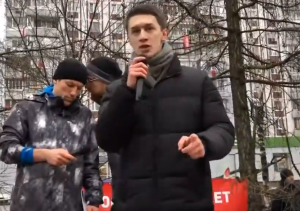
Prior to his arrest in August, Yegor Zhukov had urged people not to be cowed into silence. He had been participating in the protests.
14 September – Tatyana Kolobakina, reporter with the student media outlet DOXA, was detained in Moscow at a student rally in support of political prisoner and fellow student, Zona.Media reported. Kolobakina was detained alongside two rally participants, who were dressed in T-shirts with slogans “Freedom to Zhukov”. Kolobakina has a similar sticker on her bag. All the detainees were released briefly without any charges and were told that they had been mistakenly detained while police were checking “info about some organization”.
Links:
https://www.kommersant.ru/doc/4094194
https://ovdinfo.org/express-news/2019/09/14/na-parade-moskovskogo-studenchestva-zaderzhali-dvuh-studentov-i?utm_source=fb&utm_medium=share&fbclid=IwAR0Amm0Ai9DarRmc8-pqVgqvSrZ5FQVP-p40vlUsJhWU2HSY20GdbJ4RDuA
Categories: Arrest/Detention/Interrogation
Source(s) of violation: Police/State security
St-Petersburg journalist targeted by media outlets allegedly tied to “troll factory”
12 September – Mariya Karpenko, a former Fontanka reporter who was fired in March because of her personal Telegram-account on Saint Petersburg politics, became a target of several defamation articles, Lenizdat reported.
According to reports, the articles may be linked to Evgeny Prigozhin’s “media factory”, which publishes almost identical pro-government articles and targets independents journalists and opposition activists.
Links:
https://lenizdat.ru/articles/1156242/?fbclid=IwAR1N60ZuAzpTBNth5ynq_ctmCv1PL6K94RWCvfry99GJnqMYuqMkU1kZCU4
https://www.svoboda.org/a/29830046.html
https://primechaniya.ru/sankt-peterburg/novosti/avtora-rassledovaniya-o-finansirovanii-vybornoj-kampanii-beglova-nachali-travit-v-smi
Categories: Online Defamation/Discredit/Harassment/Verbal Abuse
Source(s) of violation: Another media
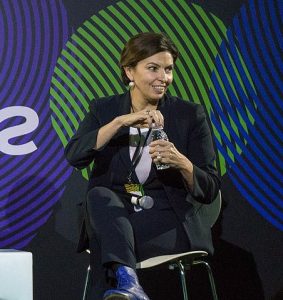
Dozhd CEO Natalia Sindeeva was summoned for questioning in September.
Dozhd CEO questioned over funding received during the July protests
10 September – CEO of independent broadcaster Dozhd, Natalia Sindeeva, was summoned for questioning related to funding Dozhd received during the July protests, Sindeeva said in Facebook post. During the protests in late July the broadcaster lifted the paywall and encouraged viewers to donate money.
Links:
https://www.newsru.com/russia/10sep2019/sind_dopros.html?utm_source=share&fbclid=IwAR1264qd3E9ksE4Prq3_7dw9fSRCP0hvF5UqMs9W8HEKngaX5LAF6BvXu_c
https://zona.media/news/2019/09/09/sindeeva?fbclid=IwAR2cA7MskqAUB5vuVXgWRKrtx6DA4FHmnLwY6hSVySzYm6EIpOXmVo10PEs
Categories: Arrest/Detention/Interrogation
Source(s) of violation: Police/State security
Bus with journalists attacked in Tuva
7 September – A bus with journalists and observers, that were going to monitor and report on the local elections, was attacked with a gun fire at the border of Krasnoyarsk region and Tuva republic, local deputy Sergey Natarov said in his Facebook.
Witnesses say the bus was attacked by a group of around 10 gunned men.
The police said that nobody was injured and said that only the front wheels of the bus were damaged.
Links:
https://www.facebook.com/photo.php?fbid=1369336403228476&set=a.405289099633216&type=3
https://www.svoboda.org/a/30152508.html?fbclid=IwAR0LyiXDB0NzNxtrvL1TZXlcaYqO1pToUXTSVOBbOwGkr9dUXY2RbZyfwt8
https://www.sibreal.org/a/30152426.html
https://t.me/pdmnews/20352
Categories: Intimidation
Source(s) of violation: Unknown
At least 3 journalists detained in Moscow before rally in support of political prisoners
8 September – Journalists Ilya Azar and Natalia Ivleva were detained in the centre of Moscow before the rally in support of political prisoners, MBH Media reported. Later MBH Media reported that journalist Maxim Kondratyev was also detained.
Links:
https://tvrain.ru/news/v_moskve_zaderzhali_zhurnalista_ilju_azara-493121/?fbclid=IwAR3kKIRLIm87drmSxftigXAff_sB0wrcuT6ap0tyoHuvRI6u3LCZOCr5frY
https://t.me/mbkhmedia/13378
https://www.mk.ru/politics/2019/09/08/v-moskve-zaderzhany-aktivisty-zhurnalisty-sredi-nikh-ilya-azar.html
Categories: Arrest/Detention/Interrogation
Source(s) of violation: Police/State security
Fly Auto sues Dozhd for 1 billion roubles
5 September – A car rental firm Fly Auto filed a 1 billion roubles ($15,300 millions) lawsuit against independent broadcaster Dozhd, Navalny said in his Twitter.
According to court documents, the lawsuit was registered on 5 September. Fly Auto accuse Dozhd of organising mass protest against the disqualification of independent candidates for local elections, that as the company claims, resulted in billion damage due to cancelled orders for car rentals, disrupted services and protesters damaging cars.
Update:
15 November – Arbitration court of Moscow dismissed the lawsuit against Dozhd TV channel, quoting lack of proof in the documents provided by the company.
Links:
https://zona.media/news/2019/09/05/flaj_avto?fbclid=IwAR1ye8yqjas57ArvgRe1uUhVF8XXX5Gd3voBuNOyfdRaV-empq0YV2VcZp0
https://www.novayagazeta.ru/news/2019/09/05/155024-kompaniya-po-prokatu-avtomobiley-podala-isk-k-fbk-i-dozhdyu-na-milliard-rubleyhttps://
www.kasparov.ru/material.php?id=5DCEA674AD5BE
Categories: Subpoena / Court Order/ Lawsuits
Source(s) of violation: Corporation/Company[/vc_column_text][/vc_column][/vc_row][vc_row][vc_column][vc_basic_grid post_type=”post” max_items=”4″ element_width=”6″ grid_id=”vc_gid:1574958188379-c9ec03b6-f725-9″ taxonomies=”8996″][/vc_column][/vc_row]


 Council of Europe member states must engage fully with the platform for journalism
Council of Europe member states must engage fully with the platform for journalism








